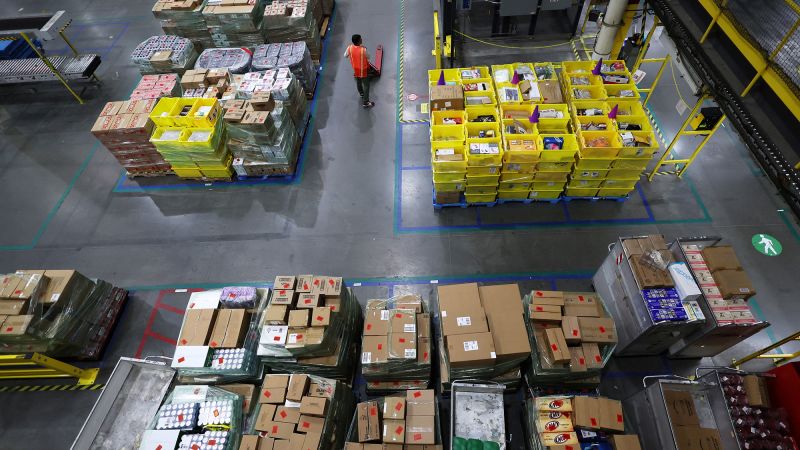Enticed by deep discounts, Americans are expected to celebrate Cyber Monday by spending a record-setting $12 billion online shopping.
Black Friday sales were strong –- especially online –- providing the latest evidence of resilient consumer spending in the face of a host of challenges.
Despite elevated borrowing costs, three years of high inflation and increasing numbers of Americans dipping into their retirement plans, consumers continue to keep the US economy chugging.
It’s another reminder that it rarely pays to underestimate the willingness of Americans to spend regardless, even if they have less money in their bank accounts -– especially when consumers perceive deals for the taking.
“This is a US economy and a US consumer that has been able to manage through a high-inflationary environment,” Michelle Meyer, chief US economist at the Mastercard Economics Institute, told CNN on Monday.
Americans are expected to spend $37.2 billion in online shopping during Cyber Week, the five days from Thanksgiving to Cyber Monday, according to Adobe Analytics. That would be 5.4% higher than last year.
Adobe estimates Cyber Monday spending will increase by 6.1% to $12 billion.
Those figures are not adjusted for inflation. However, online prices have been falling, which means the increase in spending isn’t simply the result of increased prices and inflation – there is real demand growth.
Adobe said that if online deflation was factored in, growth in consumer spending would be “even stronger.”
Retailers are relying on promotions, even more than usual, to get shoppers to open their wallets.
Adobe Analytics expects discounts of up to 35% off toys this holiday season and deep discounts for electronics (up to 30%), sporting goods (up to 24%), apparel (up to 25%) and appliances (up to 20%).
JCPenney has slashed prices on some items so much that they’re selling for pre-Covid prices. The department store told CNN on Monday it is offering 2019 prices on gifts including men’s hoodies, women’s boots, coats and some kitchen products.
The early results suggest the holiday shopping season is off to a positive start, aided in part by lower gas prices.
Americans spent $9.8 billion online shopping on Black Friday, up 7.5% year-over-year, according to Adobe Analytics.
Shoppers gravitated toward electronics, including smart watches (sales were up 577% compared with October 2023), TVs (+484%), audio equipment (+376%), Adobe said.
Another popular measure of holiday spending, Mastercard SpendingPulse, found e-commerce sales jumped by an even stronger 8.5% year-over-year on Black Friday.
Brick-and-mortar store traffic grows
However, in-store sales increased by just 1.1%, according to SpendingPulse. Mastercard noted that there were a number of sporting events on Friday, including the NFL’s first-ever Black Friday game, making online shopping an appealing option for sports fans.
“Consumers do have a lot of choice right now. They’re looking for the best deal and that best deal oftentimes… comes from your couch right after the Thanksgiving meal,” said Mastercard’s Meyer.
That’s not to say brick-and-mortar stores are empty.
Black Friday store traffic increased 4.6% year-over-year, according to Sensormatic data cited by Bank of America. Sensormatic noted this was the “most significant Black Friday increase we’ve seen in recent memory,” though traffic is still 20% lower than 2019 levels.
In another sign of sturdy consumer spending, Americans continue to travel aggressively.
Sunday marked the busiest day at US airports on record, according to federal data. The Transportation Security Administration screened more than 2.9 million passengers at checkpoints across the country, up 10% from the equivalent day last year.
The resilience of consumer spending is impressive, given countless obstacles.
Inflation is cooling, but only after three years of a very high cost of living, and with many companies reluctant to lower prices back down again. Credit card rates are also at record highs as the Federal Reserve keeps up interest rates.
At least some consumers are coming under growing financial pressure.
More Americans are yanking money from their 401(k) plans to pay the bills. Credit card balances have increased to a record $1.1 trillion and the share of households newly delinquent on credit cards is at the highest level in a dozen years. Some Americans are even falling behind on their auto loans.
Yet the historic jobs boom continues. And consumers have at least one helpful tailwind: Gas prices have plunged.
A gallon of regular gas now sells for an average of $3.25 a gallon nationally, according to AAA. That’s down 63 cents from the peak in September. In fact, this marked the cheapest Thanksgiving Day gas price since 2020, when Covid prevented many people from hitting the road.
Meyer said the early holiday shopping strength gives her confidence about the outlook for 2024. The Mastercard economist said the economy seems to be finding a “new equilibrium” after growing too rapidly in the wake of Covid.
“We are going to be settling into a more moderate growth trajectory from here,” Meyer said. “But I do think the US economy has room left to grow.”
Read the full article here




